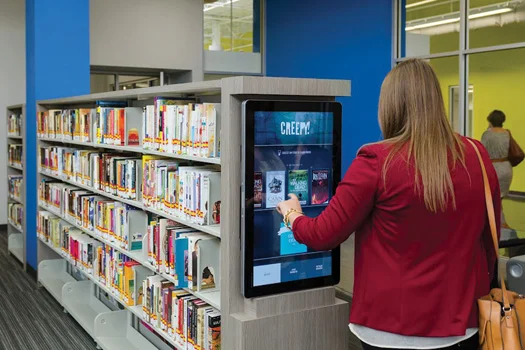As we celebrate National Librarains’ Day and reflect on the enduring legacy of Mr. S.R. Ranganathan, a pivotal figure in library and information science, it’s essential to address a pressing question: Do libraries remain relevant in our technologically advanced world?
When was the last time you curled up with a book and a cup of tea or felt the urge to share a book’s insights with friends or family? The days of eagerly spending pocket money on books and savoring the scent of freshly printed pages are now fond memories. We still cherish the first books we read and often quote them among friends, with some passages vividly etched in our minds. Occasionally, we may cling to a withered rose, symbolizing the cherished memories we associate with an old book. While decorating bookshelves with cherished collections used to be a joy, digital formats now dominate our reading habits. Many of us have shifted to accessing books through devices, finding it more convenient to relax with digital content. This shift often means we skim through chapters, missing the deeper contexts that make books meaningful.
The public library movement in India, which began in the late 19th century with the efforts of pioneers like Maharaja Sayajirao III and the Gaekwad of Baroda, aimed to democratize access to knowledge. Figures such as William Alanson Borden and S.R. Ranganathan significantly shaped this movement through library education and legislation. As the library system enters its second century, its mission to provide equal access remains crucial. Honoring those who have championed public libraries and literacy is essential for building stronger, more inclusive communities.
Recent research highlights a notable shift in library usage patterns in India. Reports, including the National Library of India’s 2019 annual report and studies published in the Journal of Library and Information Science (2020) and the International Journal of Library Science (2018), show a clear trend towards increased use of digital resources, such as e-books and online databases. This shift is further documented in articles from The Hindu (2022) and The Times of India (2021), which discuss the impact of digital transformation and the COVID-19 pandemic on library services.
The National Mission on Libraries (2021) and the Ministry of Education (2022) also reflect these changes, emphasizing the need for libraries to adapt to digital realities. A 2019 Pew Research Center study reveals that time spent on mobile phones has increased, with many dedicating more time to social media and online streaming than to reading books. The 2017 International Federation of Library Associations and Institutions (IFLA) report notes that Indian public libraries hold an average of just 5,700 books, starkly contrasting the 108,000 found in libraries in developed countries. The 2018 UNESCO Institute of Statistics report highlights that only 12% of Indian public libraries have computers, and just 8% offer internet access. Additionally, a 2016 Press Trust of India (PTI) article notes that only 10% of the 1.2 million librarians in India are professionally qualified. The Ministry of Culture, Government of India, reports that while there are 54,856 public libraries in the country, only a few meet international standards.
Once thriving book clubs and reading traditions are now rare. A 2022 National Endowment for the Arts survey highlights that people aged 20-44, the busiest demographic, are increasingly disengaged from leisure reading. Modern lifestyles, with their demanding schedules, have shifted preferences toward quick, bite-sized information through apps and online sources. In countries like Japan and South Korea, long commutes and demanding work schedules have led to a preference for audiobooks and e-reading.
A 2022 report by the National Library of India indicates that while literacy rates have improved, the focus remains on educational texts rather than leisure reading. In contrast, Scandinavian countries excel in global literacy rankings due to their emphasis on regular library visits and promoting reading habits from an early age. In developing countries, particularly in rural India, libraries face severe underfunding and staffing shortages. A 2023 study reveals that about 60% of children in rural India lack access to libraries. Additionally, modern entertainment options, such as social media, online games, and OTT platforms, often distract from reading. Surveys show that people spend more than eight hours a day on digital platforms, contrasting sharply with the time needed for focused reading.
Urbanization has led to the rise of gated libraries, cafes, and coffee shops, creating a knowledge divide based on wealth. The affluent have easy access to these spaces, while those from lower socioeconomic backgrounds are often excluded, turning knowledge into a privilege of the wealthy. This deepens cycles of inequality and marginalization, as public libraries decline and lack of internet access isolates those without resources.
In the 21st century, rural public libraries are becoming vital civic institutions. They offer open and accessible spaces that bridge information gaps, address digital divides, and reduce disparities, especially for children. These libraries serve as hubs of social equality, providing valuable resources to diverse groups, from elders reading newspapers to women’s groups starting businesses. While district libraries face challenges, they remain popular among students for studying and leisure. To maximize their impact, it is crucial to revitalize the joy of visiting libraries and support local initiatives. By doing so, libraries can fully realize their potential to foster dialogue, discussion, and inclusivity within communities.
Bijayani Mishra,PhD, is Assistant Professor, Department of Sociology, Maitreyi College, University of Delhi

